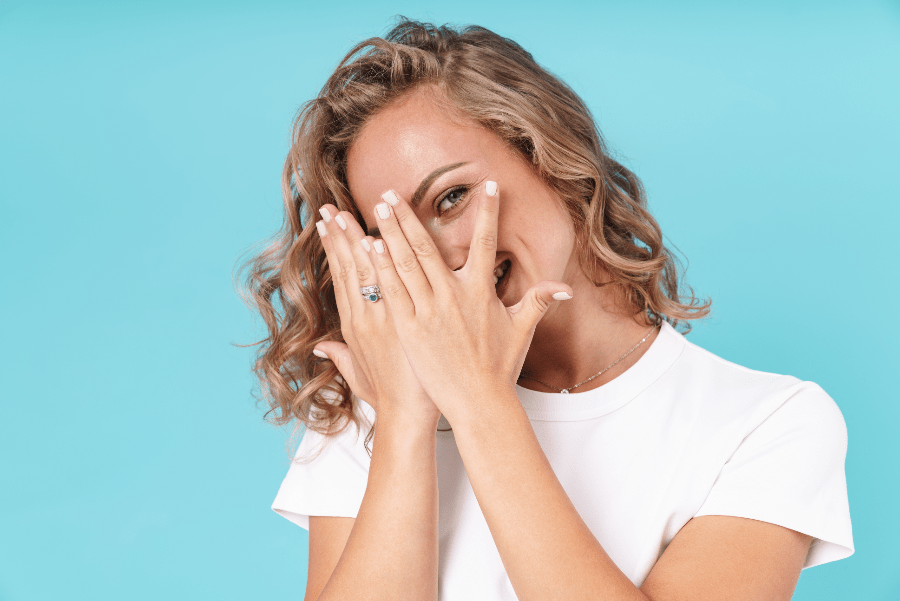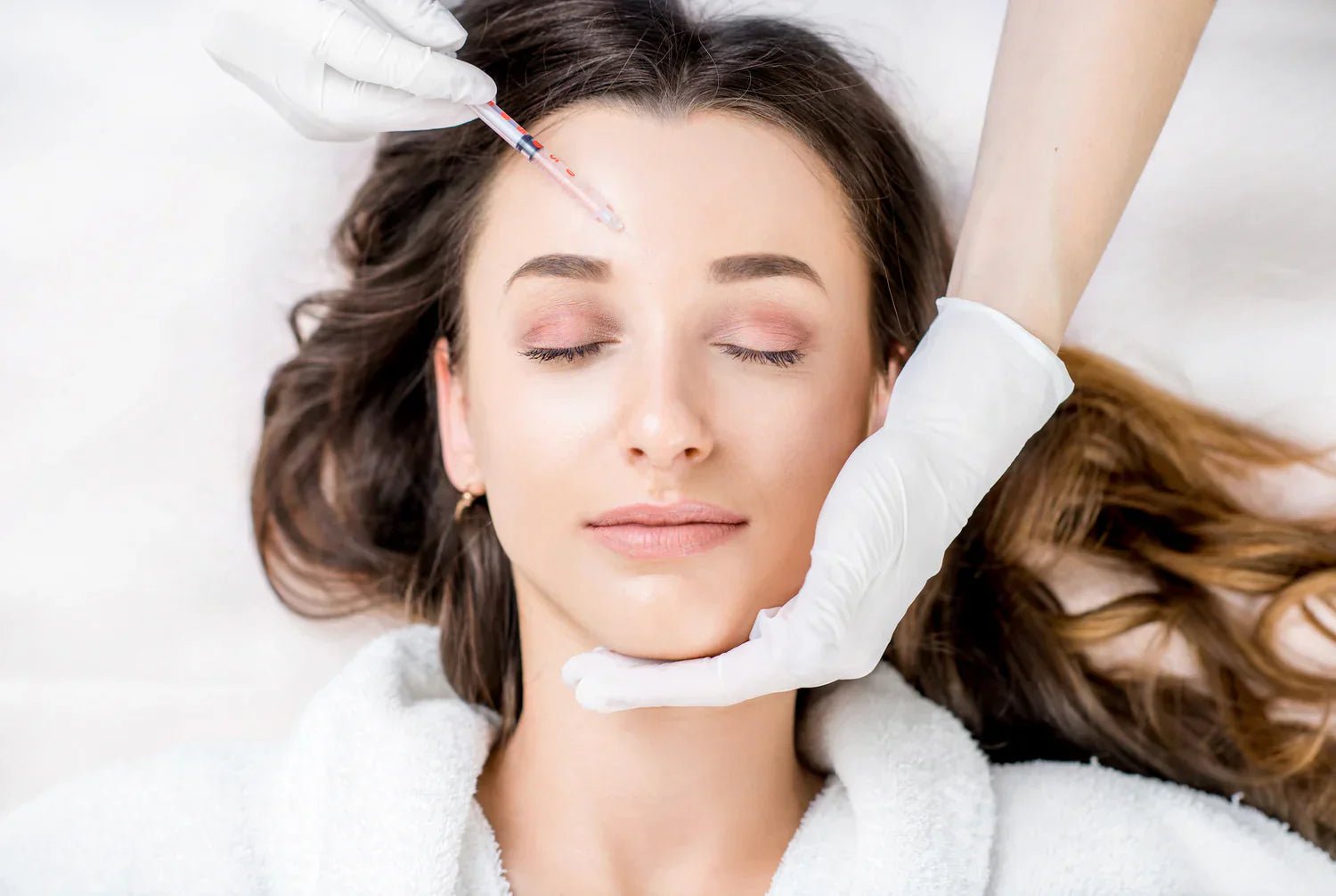Are you losing a lot of hair and already dreading combing it? Admittedly, we all dream of shiny, full hair. As our hair becomes increasingly thinner and bald spots appear, hair loss presents us with emotional challenges.
But don't worry! Firstly, many people suffer from temporary hair loss, and secondly, many types of hair loss can be successfully treated. Keep in mind that hair does not grow endlessly.
They go through various growth stages and fall out after several years. How long and thick your hair becomes is genetically determined. However, you can actively influence hair health and prevent – or even stop – hair loss.
We explain what causes of hair loss are known, what treatment options are available, and in which cases you should contact a doctor!
Book your appointment for a PRP treatment now!

Causes of hair loss
Why am I experiencing hair loss? This question concerns many affected individuals. The answer is often unsatisfactory.
Because the causes can be varied, doctors often face challenges in searching for the reason behind hair loss in many cases. The basis is the medical history. Ideally, you prepare for this by making a list of possible causes. This makes it easier for the doctor to diagnose.
Women often suffer from hormonally induced hair loss. Hormonal fluctuations can be triggered by taking birth control pills, pregnancy, or menopause. But stress, malnutrition, thyroid diseases, or infections can also cause hair loss.
Even the transition from winter to spring or from summer to fall can lead to hair loss due to temperature differences. If you notice more hair in your brush than usual in spring or fall, this is initially no cause for concern.
In addition to hormonally and genetically induced hair loss and diffuse hair loss, autoimmune diseases can also lead to hair loss.
Appropriate therapies for hair loss
Hormonal fluctuations, diseases such as thyroid disorders, or a nutrient deficiency can be determined by general practitioners, dermatologists, or gynecologists. Hormonally induced hair loss can often be remedied by administering estrogen and progesterone. These can be contained, for example, in a special hair tonic.
Are you wondering which therapy options are available and which measures might be effective in your specific case? We provide answers!
Diagnosis and treatment approaches
Doctors generally distinguish the following types of hair loss:
- genetically induced hair loss
- hormonally induced hair loss
- diffuse hair loss
- scarring hair loss
- alopecia areata
The latter is considered a special form because it is not yet clear why isolated bald spots on the head occur.
For all types of hair loss, the first step is to see a doctor. They determine which type of hair loss is present, identify possible causes, and rule out hair diseases. Then a treatment plan is developed.
So if you notice a lot of hair in your brush, the first step is to make an appointment with a dermatologist. Alternatively, you can first consult your general practitioner, who will refer you to a dermatologist to determine the type of hair loss.
The dermatologist may perform a trichoscan, trichogram, or dermoscopy if necessary. Afterward, they explain possible courses of action to stop hair loss. Medications may be used in further treatment.
Book your appointment for a PRP treatment now!
Special shampoos for prevention
Sometimes the devil is in the details: If you wash your hair too often or wear a tight ponytail daily, you may eventually notice hair loss. But your shampoo can also contribute to this.
Therefore, make sure to use high-quality products without harmful substances like silicones or irritating alcohols.
If you already suffer from hair loss, you can resort to special shampoos against hair loss. These contain ingredients like caffeine or rosemary oil and are supposed to stimulate scalp circulation.
As a result, nutrients can be transported better to your hair roots. For diffuse hair loss, choose alkaline shampoos. These products do not contain chemicals and do not irritate your scalp.
But beware: Contrary to advertising promises, you should not expect miracles from shampoos and other hair care products against hair loss. However, these products can certainly be used alongside professional therapy.
The effectiveness of dietary supplements
If your hair loss is due to a pronounced nutrient deficiency like an iron deficiency and this deficiency has been confirmed by a doctor, you can opt for a dietary supplement. It's important to choose high-quality products and consult with your treating physician.
Note that the blood test is a snapshot. If you want to prevent a vitamin or mineral deficiency in the long term, you can have the test done regularly and observe it over several years.
The rule of thumb: Only choose dietary supplements if the doctor has actually been able to prove a nutrient deficiency based on the blood test. If this is the case, supplements are suitable to compensate for the deficiency and potentially alleviate the symptoms.
Additionally, you should pay attention to a balanced diet. Opt for 2 servings of vegetables and 3 servings of fruit per day. Your plate should include complex carbohydrates, high-quality proteins, and healthy fats.
For example, a lentil soup, whole grain bread, or vegetables provide long-chain carbohydrates. Foods like quinoa, fish, meat, legumes, or tofu cover your protein needs.
Healthy fats are offered by extra virgin olive oil, extra virgin flaxseed oil, extra virgin black seed oil, avocados, algae, and flaxseeds. You can add a teaspoon of oil or flaxseeds to your morning serving of plain yogurt with fruits like kiwis, sunflower seeds, pumpkin seeds, and oats.
Natural home remedies
Organic rosemary oil is said to promote blood circulation to the scalp. You can obtain this high-quality oil at the pharmacy. If you perform a scalp massage with rosemary daily, your hair could benefit from this treatment. Both the massage and the oil can affect nutrient transport and may lead to healthy hair.
You can make a care shampoo from honey, vinegar, and onion juice. This remedy is supposed to strengthen the hair roots.
However, if there is pathological hair loss, home remedies show no effect. In this case, you should contact a doctor.
The benefits of scalp massage
If you're experiencing hair loss because you're stressed, a scalp massage can provide relaxation and promote blood circulation to the scalp and nutrient supply to the hair. You can perform the scalp massage yourself and in conjunction with therapy.
The choice of hairstyle and styling
Traction alopecia occurs when your hairstyle causes hair loss. A tight ponytail, braids, buns with hairpins, or incorrect styling can cause your hair to appear increasingly thinner.
But headscarves, headbands, and helmets also damage the hair roots through friction. Therefore, opt for loose hairstyles and avoid head coverings as much as possible. Of course, you should not forgo the mentioned protection when cycling, motorcycling, or in the height of summer.
Additionally, heat treatments with a flat iron, blow dryer, or curling iron can cause not only hair breakage but also hair loss. But dyes, permanent hair colors, and bleaches also damage the hair.
Hairsprays additionally cause hair breakage. As a result, your hair appears duller, thinner, and flatter.
With the right hairstyle, you can conceal bald spots on the head. Short hairstyles also make the hair appear thicker and healthier.
A note: Try to avoid extensions for your hair or eyelashes. They can lead to hair loss by causing hair follicles to become inflamed and die.
The benefits of regular exercise
Can you finally unwind after a long workday by exercising? Your hair health also benefits from regular physical activity. Exercise can reduce stress, leading to the production of fewer stress hormones.
This is particularly important if you suffer from a form of hair loss like alopecia areata. Stress can worsen the symptoms, so plan regular endurance and strength training sessions.
After a workout, the body has better circulation, allowing the nutrients and oxygen from your diet to reach your hair.
Sweating cleanses your skin. The pores open, and toxins are expelled. A healthy scalp is the foundation for healthy hair.
Extreme athletes with hair loss should avoid doping or using muscle-building products as these can accelerate hair loss.
The importance of a balanced diet
Your diet provides carbohydrates, proteins, fats, vitamins, minerals, and water. These nutrients are needed by the body for numerous functions. If we consume enough health-promoting foods, we are ideally rewarded with good health.
But when is a food considered healthy? There is no single truly healthy food. However, by combining the right foods and varying our meals, we increase the chance of obtaining all the necessary nutrients from our diet.
Complex carbohydrates are considered health-promoting. Therefore, you should focus more on foods like oatmeal, oat bran, and legumes such as peas, lentils, and beans.
You should not regularly consume simple carbohydrates from burgers, pizza, and the like. Also, make sure to consume plenty of proteins. You can achieve this by eating foods like meat, fish, dairy products, eggs, and legumes.
Good fats are found in high-quality cold-pressed olive oil, linseed oil, or walnut oil. Ideally, use rapeseed oil with monounsaturated and omega-3 fatty acids for frying and avoid sunflower oil.
Certain groups, such as people with eating disorders or seniors, may consume too few nutrients and therefore experience hair loss. Vegetarians or vegans may also suffer from diffuse hair loss.
However, this only applies to the latter if they consume too little iron or vitamin B12 through their diet. If you eat enough dairy products and eggs, you often do not have a vitamin B12 deficiency. You can obtain iron from foods like oatmeal, flaxseeds, pine nuts, pumpkin seeds, pistachios, amaranth, quinoa, and lentils.
A guideline: According to the German Nutrition Society, adult women who are mostly inactive should consume about 1,900 kilocalories per day. Men who are mostly inactive should reach 2,400 kilocalories. The higher the physical activity level (PAL), the more calories should be consumed.
People with eating disorders often do not reach these values. Many seniors also consume too little food and fluids. They most frequently suffer from a vitamin D and vitamin B12 deficiency.
An unbalanced diet can also exacerbate alopecia areata. An anti-inflammatory diet rich in vegetables, fruits, herbs, spices, omega-3 fatty acids, and fermented foods like sauerkraut or kimchi is often recommended for those affected.
Sugar and wheat, as well as additives, should rarely appear in the diet. This also applies to healthy individuals aiming for a health-promoting diet.
A balanced diet protects you from nutrient deficiency and also promotes hair health.
A tip: Those who also pay attention to adequate fluid intake additionally support hair growth. If you don't drink enough, your body uses the available resources to maintain the functions of vital organs. Therefore, permanent dehydration can harm your health.
The DGE recommends a daily fluid intake of 1.5 liters. You should consume water or unsweetened tea instead of soft drinks.

Regenerative Treatments
Full hair through PRP: Regenerative treatments refer to methods that do not require surgical intervention. They promote the body's self-healing powers and are considered to be low in pain.
Through PRP therapy, Platelet Rich Plasma Therapy, you can succeed in stimulating hair growth. For this, you should know the cause of your hair loss and have already undergone all necessary therapeutic measures.
The PRP method is also referred to as autologous blood therapy. The doctor draws your blood and processes it specially. This creates a serum with blood plasma and platelets. The cytokines, growth factors, and micronutrients contained can activate your hair roots and promote hair growth.
An alternative is stem cell therapy. In this process, subcutaneous fat tissue is removed, from which stem cells are extracted. These are then injected into the scalp. They can also stimulate hair growth.
The principle of hair transplantation
Have you already successfully stopped your hair loss but suffer from thin hair and bald spots? A hair transplant may be the last option to fulfill your dream of full hair.
This involves a surgical procedure, which—like any surgery—carries risks. First, you should do everything possible to identify the cause of your hair loss and have it treated. Only when your hair is no longer falling out does it make sense to consider a hair transplant.
If the procedure is performed while you are still experiencing hair loss, there is a high risk that the hair will grow in the recipient area and bald spots will form around it. The result is therefore not optimal.
In the FUE method, the surgeon removes hair follicles from the back of your head and implants them in the desired areas on your head. Many practices exclusively perform transplants with your own hair.
The requirement: You should have sufficient hair in the donor area. Body hair can also be transplanted. The hair continues to grow here, and the result looks natural.
Hair loss—when to consult an expert?
If you notice that too much hair accumulates on your pillow or in the drain over a longer period, you should have the hair loss medically clarified.
Before the doctor's appointment, make a list and consider what possible causes could have triggered the hair loss. Do you eat a balanced diet? Do you dye your hair? Do you always wear the same ponytail? Or do you suffer from a disease?
The doctor, who could be your general practitioner or a dermatologist, first looks for the reason behind your hair loss. To do this, they inquire about your lifestyle and medical history.
The medical history forms the foundation. Afterwards, they examine your scalp and conduct various tests. Once it's clear what type of hair loss you have, the doctor creates a treatment plan and ideally provides helpful tips for daily life. On average, it takes up to 3 months for your hair to recover.
Book your appointment for a PRP treatment now!
FAQ
What helps against hair loss the fastest?
There are no miracle cures for hair loss. You should first find out why you are experiencing hair loss and have a doctor determine the type of hair loss.
What helps 100 percent against hair loss?
Many shampoos and similar products promise a quick cure for hair loss. However, they cannot work if you don't know the cause and form of your hair loss. Your doctor will give you helpful tips on dealing with pathological hair loss.
Which vitamin is missing when you have hair loss?
The body can produce healthy hair if we have a comprehensive diet. People with hair loss often suffer from an iron or vitamin B deficiency. However, this cannot be generalized.
What do doctors recommend against hair loss?
Different forms of hair loss require different therapies. Therefore, doctors can only make recommendations after they have examined you and determined the type and reasons for your hair loss. In the case of a nutrient deficiency, they can prescribe supplements. If it's an infection, the disease must be treated first before the hair can recover.
The conclusion – numerous ways to counteract hair loss
Basically, a hair root supplied with nutrients has optimal conditions to produce healthy hair. However, illnesses or an unfavorable diet can lead to hair loss.
Pay attention to a balanced diet with plenty of vegetables. This ensures that your body receives all relevant macronutrients and micronutrients like Vitamin C.
When it comes to hair care and styling, use gentle products and avoid silicones, parabens, paraffins, sulfates, paraffins, PEG, microplastics, propylene glycol, formaldehyde, and EDTA as much as possible. Heat, tight hairstyles, and extensions also damage your hair.
If you are already experiencing hair loss, you can try special care products or home remedies. For diffuse hair loss, the PRP method can lead to satisfactory results. If you already have a partial bald spot or have been diagnosed with scarring hair loss, you have the option of undergoing a hair transplant.
Book your appointment for a PRP treatment now!





